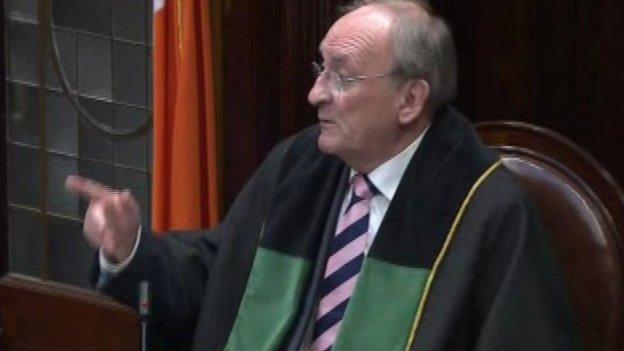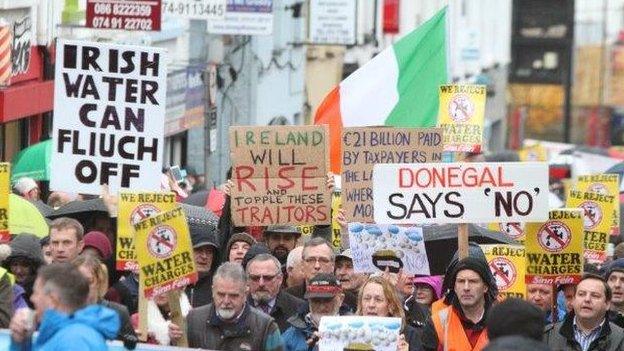Mary Lou McDonald: Irish parliament is suspended after Sinn Féin deputy leader refuses to leave chamber
- Published
Mary Lou McDonald was been suspended from the Irish parliament for refusing to take her seat
The Irish parliament has been halted after Sinn Féin deputy leader Mary Lou McDonald refused to leave the chamber.
Party members staged a sit-in protest in the chamber after Ms McDonald was suspended for refusing to take her seat.
She had asked a question about water charges and refused to sit down afterwards.
Members voted to suspend her but she refused to go. The speaker refused to return to the chamber until she left.
It meant the day's schedule had effectively been abandoned. The house has now been formally suspended and will not sit again until next Tuesday.
Ms McDonald has now left the chamber. It has since emerged that Ms McDonald has been excluded from the Dáil until 19 November.
Speaker Sean Barrett said the "stand-off in the Dáil" was "deeply regrettable especially when important business is being dealt with".
He said he had asked the Captain of the Guard to ensure she was removed from the House but, to date, the captain had been "unsuccessful in his efforts".
In a statement, Mr Barrett added: "I cannot resume the business of the House until this sit-in is stopped.
"It must be clearly understood that it is not my decision that deputy McDonald leave the House but it is a decision that was taken by the majority by way of a vote."
More than two hours after the Dublin Central TD was voted out of the House, Ms McDonald remained in the chamber surrounded by her parliamentary party colleagues, including party leader Gerry Adams.
Writing on Facebook, Ms McDonald said: "I'm still here in the Dáil chamber. Somebody had to make a stand for those that are struggling.
'Stunt'
"The question to the tánaiste [deputy prime minister] still stands: can you give people an assurance that the state will not deduct water charges from people's wages, pensions and welfare payments? People are literally terrified. Can you please reassure them?"
However, Fine Gael TD for Cork South Central, Jerry Buttimer, accused Ms McDonald of a "stunt" that, he said was "directly designed to deflect attention away from the party's treatment of abuse victims".
On Wednesday, there were bitter exchanges in the House as it debated allegations of sexual abuse by members of the republican movement. It was tabled to deal with allegations arising from the Maíria Cahill case
After Ms McDonald's action on Thursday, Mr Buttimer said: "As a member of Dáil Eireann, I take genuine offence that Sinn Féin would use our parliament as a prop to deflect attention from the negative media coverage over Sinn Féin's treatment of sexual abuse victims.
"It disappoints me that Mary Lou McDonald, who herself is an able parliamentarian, is prepared to derail the democratic function of the Dáil in order to try and change the media agenda.
"Asking questions she knows well the tánaiste cannot answer until decisions are made on water charges next week is her excuse for this play acting. Not satisfied with causing Dáil business to be suspended, she is also ignoring the majority vote of the Dáil - this is democracy Sinn Féin-style."

Ceann Comhairle of Dáil Éireann Sean Barrett suspended proceedings
The introduction of water charges in the Republic of Ireland is a controversial austerity measure.
It is a key part of the government's plan to pay back the international financial bailout the state had to seek in 2010.
The Fine Gael-Labour coalition government has said the charges are necessary because it costs roughly 1 billion euros (£790m) a year to supply water out of general taxation.
But up to 40% of that supply is subject to leakage because of poor pipes and lack of investment in infrastructure over the years.
The government believes that problem can only be solved by creating Irish Water, which came into effect on 1 October, and getting it to generate enough income to remedy the problem.
Many believe the issue could cost the coalition government the next election in 2016.
- Published3 November 2014
